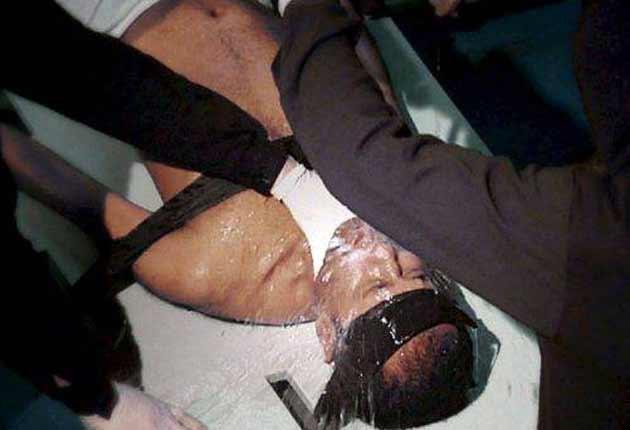I suffered post-traumatic stress after being waterboarded on Ken Loach set, says actor

A former paratrooper claims he suffered sustained panic attacks and post-traumatic stress after being waterboarded for a scene in a new film by Ken Loach. Trevor Williams said he was strapped to a bench press, had his feet elevated, hands tied and face covered with a rag while experiencing "simulated drowning" for a total of 80 seconds, halting only when he gave small thumb signals to the crew.
Loach's uncompromising drama, Route Irish, released today, tells the story of a traumatised private security contractor, Fergus, played by Mark Womack, who rejects the official explanation of his friend's death in Iraq and sets out to discover the truth surrounding the British government's use of private contractors there. Fergus eventually resorts to the torture of another guard, played by Williams, whom he believes was involved.
Williams said his first panic attack came the day after filming, in 2009, on a train from Liverpool to Manchester. "I was just sitting with a cup of tea when I started sweating and hyperventilating," he said. "I'd never really believed in panic attacks but I knew I had to get off the train." He sought advice from a former SAS soldier Ben Griffin, who served as a military expert on set. He told him he was experiencing flashbacks involving "the feeling of a wet rag over my mouth" and "suffocation". Williams was told he was "probably suffering from post-traumatic stress" and considered seeking therapy.
Fifteen months on, although the symptoms have lessened, Williams said he still gets the occasional moment of panic when "walking down the street" and "for a while felt uncomfortable in a bath". The Bury-born actor, 40, said he made the decision to forgo a breathing apparatus during the scene because he felt it would affect the film's continuity. "We started with a tube in my throat so I could breathe, but when it came down to filming I heard Chris [Mendes, the cameraman] say to Ken [Loach], 'It's going to be hard to make this work', so I suggested we just do it for real. Ken made sure I was OK with it, but it seemed like the best option. And I don't think you could do it any realer [sic] than we did."
Despite having a team of medical staff, crew and Griffin on set, Williams described how during the penultimate "drowning", he was suddenly overwhelmed and, to his embarrassment, started crying. "I don't really remember it but by that stage I was so exhausted," he said. "Even though I was in a safe environment, and it was up to me when Mark [Womack] stopped pouring, there's a small part of your brain which loses all rational thought and turns into fear. Those tears came from real panic."
Loach maintained that the waterboarding scene was crucial to the film's message. "We've stuck by the Americans who have done it and in that sense, we've tacitly agreed to it," he said. "And in my mind, waterboarding fitted with Fergus's character."
The director praised Williams, describing him as "a theatrical knight". He maintained that the scene was aimed at highlighting the "disgusting" practice of torture which George Bush described in his memoir, Decision Points, as "simulated drowning".
Williams added: "I've never been totally opposed to torture if the information gained saves lives, but now I know it's atrocious and I understand why Ken wanted to make this film."
President Barack Obama banned the use of waterboarding in 2009 but Loach, 74, believes it is still being used.
Subscribe to Independent Premium to bookmark this article
Want to bookmark your favourite articles and stories to read or reference later? Start your Independent Premium subscription today.

Join our commenting forum
Join thought-provoking conversations, follow other Independent readers and see their replies